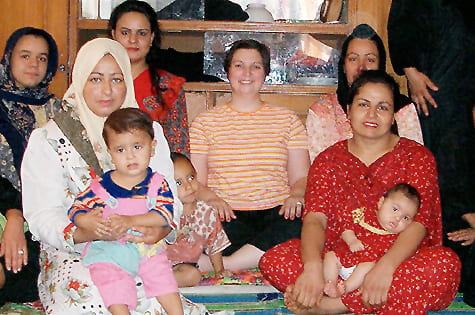Back from Baghdad
Doctoral candidate Susan Kupperstein is on the ground floor, helping to build democracy in Iraq

When Russell Dalton opened the e-mail sent by his student, Susan Kupperstein, he saw a picture that brought him up short. There sat Kupperstein, cheerful as a camp counselor, among black-robed and veiled Iraqi women.
“I said, ‘This is really something,’” Dalton recalls. “This is how UCI affects the real world.”
Dalton is director of UCI’s Center for the Study of Democracy. Kupperstein is a Democracy Fellow who, having completed her course work toward a doctorate in political science, has become a full-time program officer for the National Democratic Institute for International Affairs in Washington, D.C.
“Susan is one of our best and brightest,” Dalton says of Kupperstein. “She will be a true star of our program. She takes the theory of academia and applies it to real-world challenges.”
It was on an NDI assignment that Kupperstein found herself among the first non-governmental workers to enter post-war Iraq. In late June and early July, she worked on an assessment mission and helped organize focus groups to learn how Iraqi citizens felt about the defeat of Saddam Hussein.
A member of the team assigned to southern Iraq, Kupperstein and other team members, including English-speaking Iraqis, went looking for people willing to talk about the future they want for their country.
A NEW PERSPECTIVE
“We would walk around the street, looking for political organizations. We’d tell them, ‘We’re interested in hearing what you think.’
“We were never in danger,” Kupperstein says. “The most scared I ever was had to be the night Saddam’s sons were killed. We didn’t know they were killed, but we heard lots of gunfire. We thought maybe it was a police chase, but it was celebratory.”
Between June 29 and July 9, more than a dozen focus groups were conducted across Iraq. Efforts were made to keep the groups homogeneous. The thought was that each group – men, women, Kurds, Arabs, Sunnis, Shiites and Christians – would be more likely to speak freely in isolation from the others. In other settings, Kupperstein says, women often were outspoken, and “the men were fine with it.”
In a reversal of America’s usual pattern, she says older men and women tended to be more eager than their adult children to reach out for democracy. They remem-bered freedom, she said; their children, who had known only Saddam Hussein, had trouble imagining it.
HOPE FOR THE FUTURE
An NDI report released in Washington on July 28 gave the world one of the first looks at the opinions of ordinary citizens in post-war Iraq. They were grateful for the ouster of Saddam Hussein, the report said, but they wanted order and governance. They held differing views about the role that should be played by Islam. They “live in a fog of disinformation,” still encumbered by the propaganda of the Saddam years.
In Kupperstein’s view, the report (available on the Web atwww.ndi.org) quickly began affecting public debate in America. “We’ve had amazing feedback,” she says. “This report is being read by people from all levels in the government. It’s had a huge impact.”
For the 30-year-old Kupperstein, whose ambition is to become U.S. Secretary of State, the work in Iraq is similar to work she did, also for NDI, in the West African nations of Mali, Togo and Cote d’Ivoire. All involve helping democracy grow in areas where totalitarian regimes have fallen. It is work that is full of hope, but not because democracy is an American product.
“It’s not something that needs to be exported or imported,” she says. “It’s in the people. I think democracy really takes root in places where people are empowered to make their own choices.”
Kupperstein is planning to return to Iraq to help build the infrastructure of democracy. If the Iraqi people are free to rule themselves, she says, “It will all fall into place. It’s still falling into place in the United States, 200 and more years after we first started working on it.”
| DEVELOPING DEMOCRACY ON A GLOBAL SCALEFounded at UCI in 1990, the Center for the Study of Democracy involves 30 faculty members from four University ofCalifornia campuses: Irvine, Los Angeles, Riverside and San Diego. Russell Dalton, director since 1995, describes the center’s mission as a concentration on “research and education to provide a better understanding of how to develop democracy around the world and strengthen it in the United States and other democracies.” In 1995, the center received a grant from the National Science Foundation to train students in democracy. When the grant expired, UCI’s donor community stepped up with contributions to keep promising students coming to the university. Susan Kupperstein was one recipient; she was a William F. Podlich Fellow, named for the highly respected co-founder of Pacific Investment Management Co. in Newport Beach. Arriving from across the United States at the rate of three to five per year, recipients of Democracy Fellowships have linked UCI to democracy projects around the globe. One student worked with former President Jimmy Carter on election obser-vations in Nicaragua. Another, a Vietnamese-American, went back to her native country to help conduct Vietnam’s first public opinion surveys. Yet another is employed in the office of U.S. Speaker of the House Dennis Hastert. And one helped count butterfly ballots in Florida after the 2002 presidential election.
Dalton sees democracy as “working better and better,” partly because the end of the Cold War has meant that more countries are moving toward democracy. At the same time, citizens everywhere are more cynical about their governments, Dalton says, but that can be seen as a good thing for democracy overall, because the citizens are demanding higher levels of performance and ethics than they used to. |

